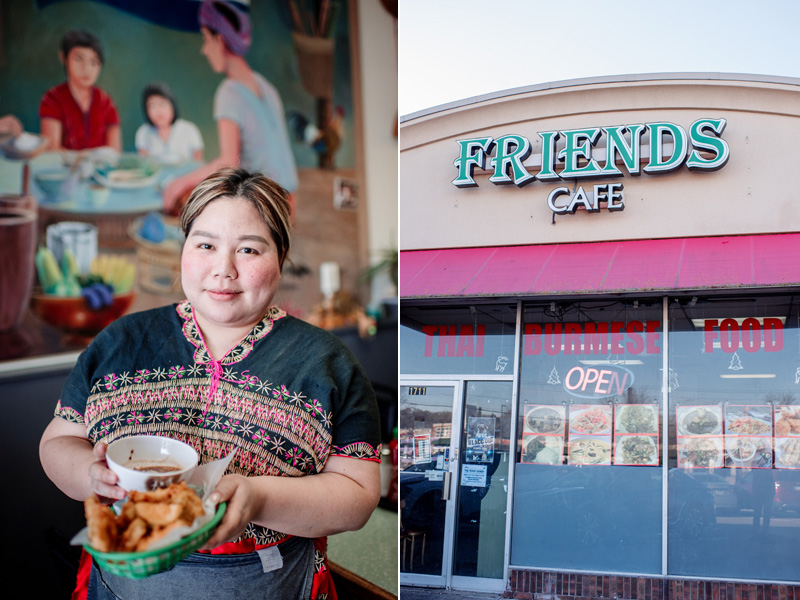PHOTOGRAPHS BY BECCA DILLEY (FRIENDS CAFE AND TOP) AND MACY-CHAU DIEM TRAN
This story originally appeared in the March 3, 2023 edition of our subscribers-only newsletter.
From the warm, deep curries of south Asia, to the egg noodles and sticky rice of Southeast Asia, the people of Myanmar (formerly known as Burma) have for generations borrowed elements from neighboring cuisines and pushed them further to create their own unique foodways. There has been no lack of inspiration – influences on the food of Myanmar include traditions from neighbors including China, India, Thailand, and more. The country is home to more than 135 ethnic groups and its history includes many waves of migration and displacement – recent conflict has sent refugees fleeing the region to destinations including the Upper Midwest.
Minnesota is home to the largest Karen community (pronounced KAH-ren) in the United States. Karen insurgents have fought the country’s central government since 1949, looking to win autonomy on behalf of the country’s third largest ethnic group.
With over 20,000 Karen people, and more than 2,000 refugees from other Myanmar ethnic groups, Minnesota is a prominent hub for Myanmar communities. And wherever people gather, they have to eat. Saint Paul is home to a small but rich archipelago of markets and restaurants serving food from Southeast Asia with an emphasis on traditional dishes from Myanmar. Often overshadowed by Thai cuisine, the foods of Myanmar (and its inseparable immigration stories) remain unknown to most Minnesotans.
FRIENDS CAFE | 1711 Rice St, Saint Paul
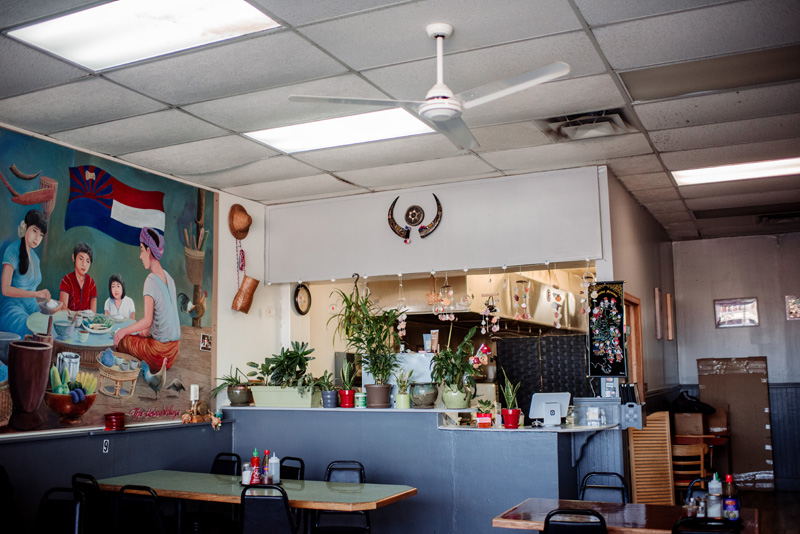
Law Law, whose mom and dad own Friends Cafe, shared her family’s stories and food with us. The restaurant was opened in 2014 by a group of Burmese friends (hence the name). After three years of running the restaurant, Law Law’s parents took over the business in 2017.
Law Law’s family fled Myanmar to Thailand around 1995, when the Burmese military invaded their land and forced Karen people to escape to the Thai-Myanmar border. The Bamar, the majority ethnic group in Myanmar, controlled the state’s military, which has historically been used to terrorize ethnic minority groups, such as the Karen.
Law Law explains: “Our family was lucky enough because my grandpa worked in the army so he knew the news ahead, and our family could escape first. I didn’t have the experience of running into the jungle or climbing up mountains,” she added, while noting that many other refugees had far more grueling voyages to safety.
After her family fled, Law Law spent many of her childhood years in Thailand; in 2004 her family was finally resettled as refugees in Minnesota. At the time her family came, there were only a handful of other Karen families in the Twin Cities. Many Minnesotans didn’t understand who the Karen people were, and where they came from. “Most people say ‘Korean’ because they mistake ‘Korean’ and ‘Karen.’ We don’t have a country of our own, so it’s hard to explain who we are.” Now, the St. Paul area is a prominent home for the Karen diaspora; the city is scattered with Karen and Burmese businesses.
These businesses have cultural and community significance to Karen peoples making their home in Minnesota, including Friends Cafe. “We are lucky enough to open a restaurant that serves our at-home, traditional food,” says Law Law. “We are lucky to be able to put it in a place where other people are able to come and try it. [It’s a space for] our people to come and eat a snack, or people who don’t want to cook at home.”
Law Law described the flavor base of many Myanmar foods as a medley of red onions, tamarind, garlic, ginger, and plenty of fresh herbs. It’s not usually as spicy as Thai food, and tends to be more of a mixture of sour and salty. Myanmar cuisine also borrows from Indian spices and flavors, which is why you can find samosas on the menu. “We use masala a lot in our curries, especially when we cook at home,” says Law Law.
TEA LEAF SALAD AND BEYOND
For those trying Myanmar food for the first time at Friends Cafe, Law Law recommended their top selling Burmese dishes: Tea Leaf Salad ($10), Shrimp and Eggplant Curry ($15), Egg Noodle Salad ($11), and Deep Fried Gourd ($9).
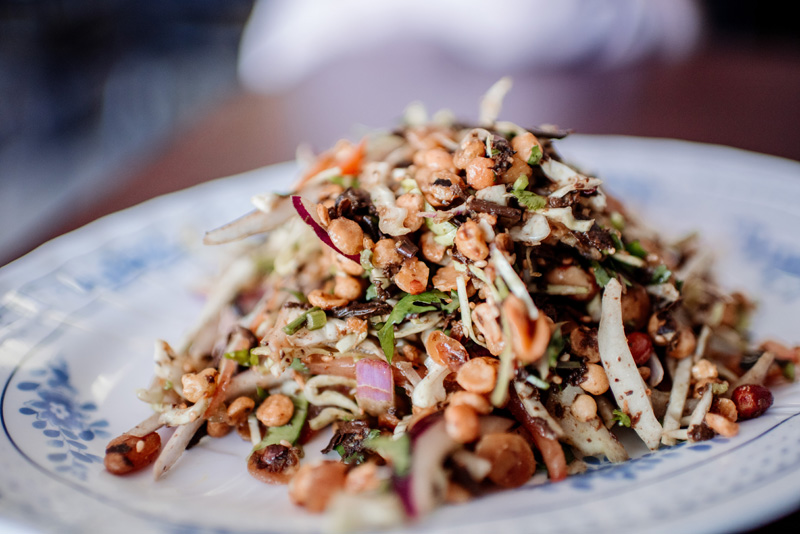
Tea leaf salad is a famous snack throughout Myanmar and consists of fermented green tea leaves, crispy deep-fried nuts and beans, raw cabbage, and tomatoes. Law Law’s family ferments their tea leaves in-house, ensuring freshness. The tea leaf salad at Friends Cafe is mild and easy to eat for both newcomers and Myanmar residents alike. It is not too pungent nor spicy, allowing the tea leaf flavor to shine, and the crunchy texture of the beans compliments the lightness of the cabbages and tomatoes. Law Law says: “If you’re feeling sleepy, this will wake you up. When I was younger, my mom didn’t like me to eat it too much, but I loved it!”
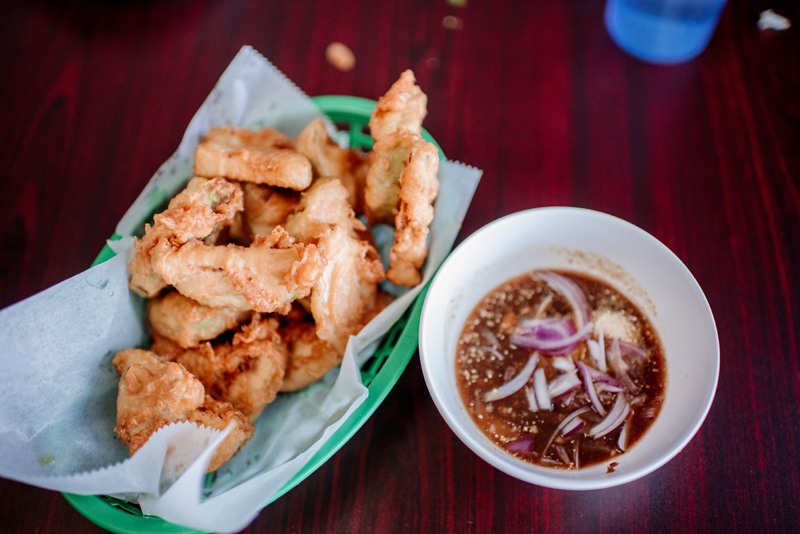
The restaurant’s deep fried long bottle gourd is fresh-fried, which captures and seals all of its juiciness within a perfectly crispy batter. However, the tamarind, fish sauce, shallots, and rice powder dipping sauce is truly the star of this dish, and it’s made daily by Law Law’s sister, Melinda Taw (pictured, top). The sauce lightens up the dish and packs a fresh, tart punch.
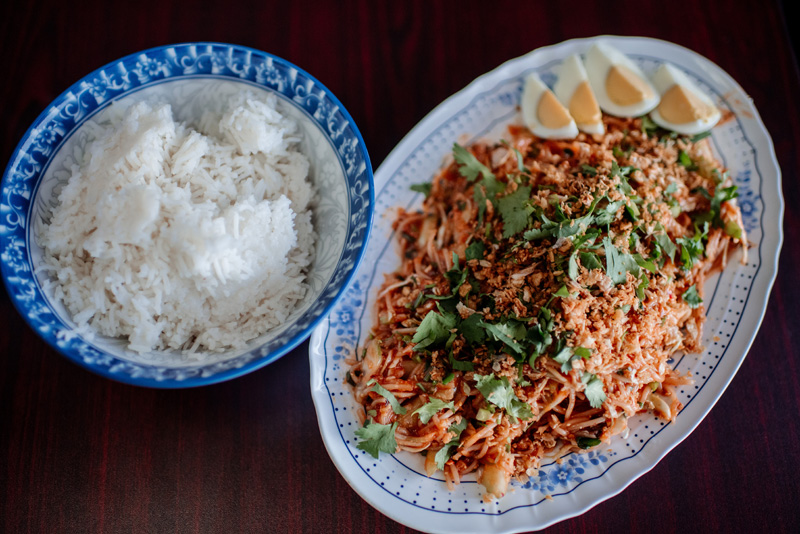
Unlike the tea leaf salad, the Friends Cafe egg noodle salad comes out warm, and is tossed with a creamy, spicy mixture of tamarind sauce and rice powder. The tamarind sauce gives the noodles a bright, sweet taste, and the chilies present a surprise kick.
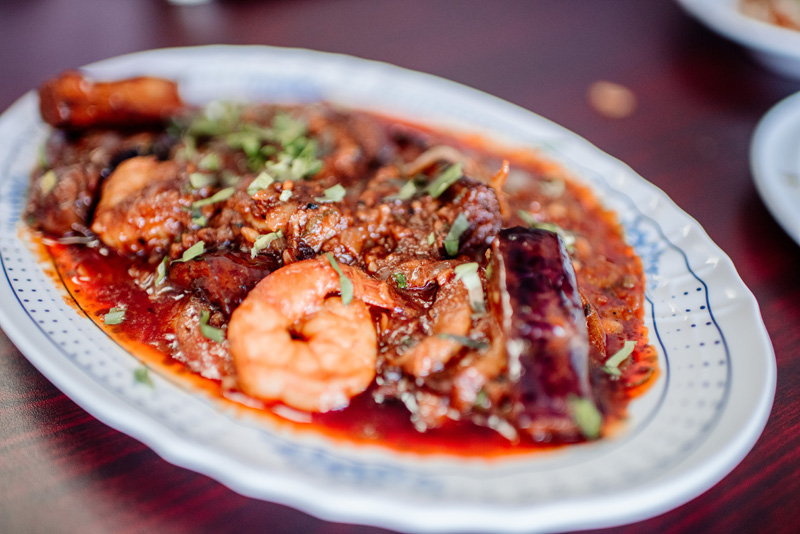
The shrimp and eggplant curry was mesmerizingly rich, pairing perfectly with jasmine rice. The ginger, shallot, garlic, tamarind curry paste merge with spices like paprika to create a warm and filling dish. Grilled eggplant lends a smoky aroma and creamy, decadent texture to the curry.
KYAW KAREN MARKET | 945 Rice St., Saint Paul
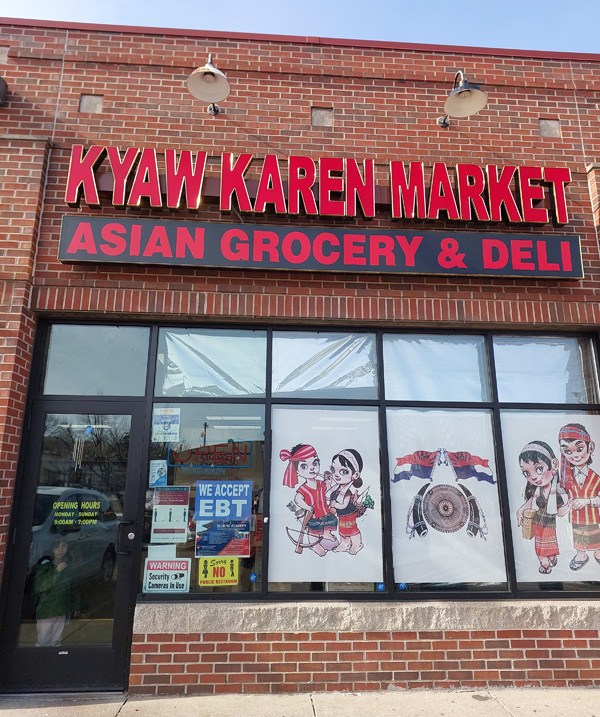
A steady stream of locals filed into Kyaw Karen Market for a quick bite during lunch hours, filling the small market’s cozy deli area. The market and deli is marked clearly as a Karen community space, with Karen and Burmese signs and posters along the doorway, and customers speaking their ethnic language. It might be intimidating as an outsider, but the process is pretty straight forward—point to the curry you want, grab whatever rice, deserts, or snacks are on the side, and take home an extremely affordable feast (entrees range from $8-10). There are only a few tables for sit-in customers, so make sure to specify if you are eating there or taking the food out.
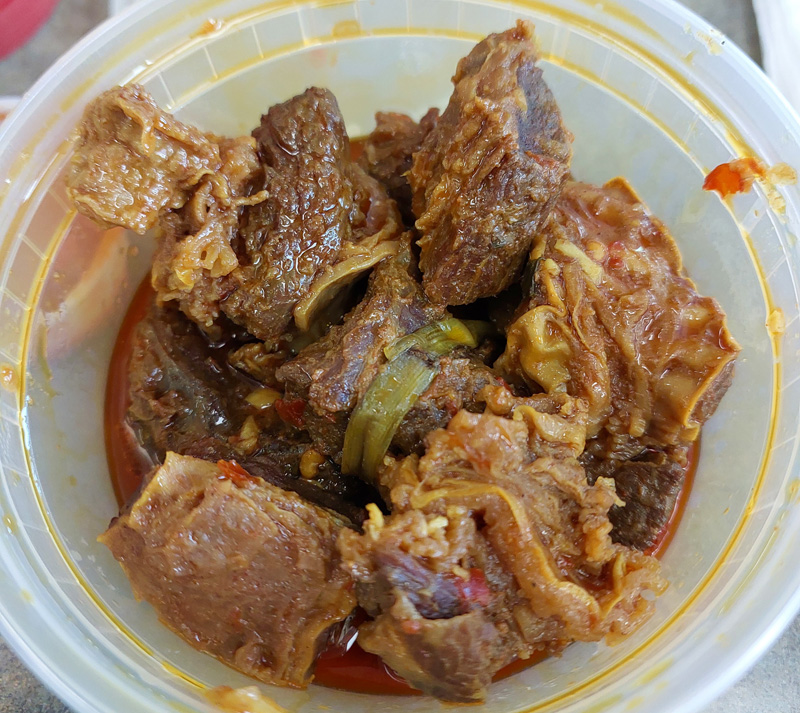
There are both made-to-order dishes (mostly Thai food) and pre-made, hot Myanmar curries and snacks. We opted for the Burmese fish and beef simmering in red curry oil, which was paired with sticky rice. Both fish and beef were stewed in a similar curry base until tender, but the catfish ($8) had clear notes of lemongrass, giving it a brighter, lighter feel than the comforting and heavy beef curry ($10).
You’ll find samosas at many Karen delis, but there were none displayed in the front cart. However, don’t be afraid to ask, because to our delight, a new batch was being fried fresh in the back. These deep-fried pockets were filled with chicken and vegetables and dipped in a sweet and tangy sauce that brought depth to a simple snack. At five dollars for six samosas, it could have even been our main meal.
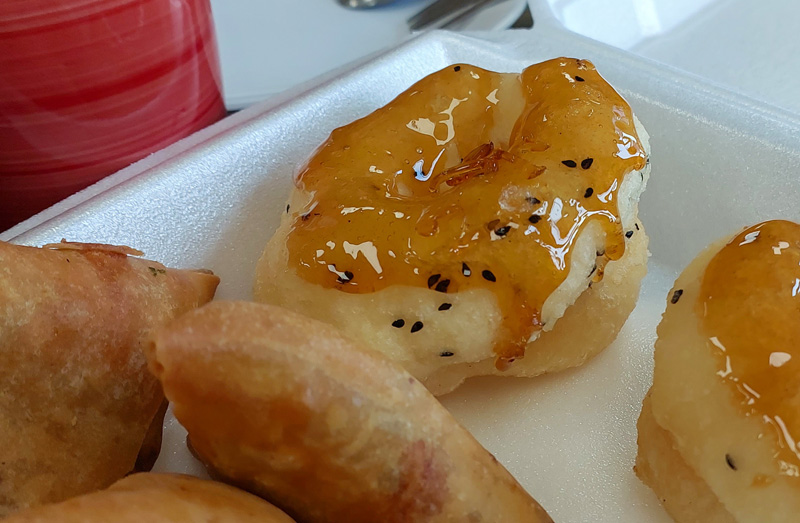
We finished the meal with fried sticky rice donuts ($2.50), glazed with caramelized sugar and tossed with black sesame. The dense texture of the donut surprised us, similar to a mochi donut with its satisfyingly soft chewiness; yet, it had a noticeable crisp and bite from the fry and the hardened sugar.
There is a bit of a “secret” menu item that we nearly missed. Stored in a hot soup pot behind the counter is Burmese fish noodle soup, known as Mohinga ($8), fresh-made every day. The strong smelling onion, daikon, fishy soup base is poured over rice noodles, crunchy long green beans, and cilantro, with lime and chili on the side. Squeezing the lime juice on top is a must, as it balances the saltiness and umami of the broth.
Also dressing the soup is a crunchy deep-fried chickpea chip/fritter, which adds a pop up texture to the silky soup, while soaking up the flavors. This is a very popular dish in Myanmar that is surprising to find in Minnesota, and it resides quietly at this little unassuming market on Rice Street.
NAM MU ASIAN MARKET | 1377 Arcade St., Saint Paul

Formally known as “Original Karen Market”, Nam Mu market is now under new ownership in the same location. On Google maps, it’s still known as “Original Karen Market” or “Irrawaddy Restaurant.” Even smaller than Kyaw Karen Market, the deli is strictly take-away.
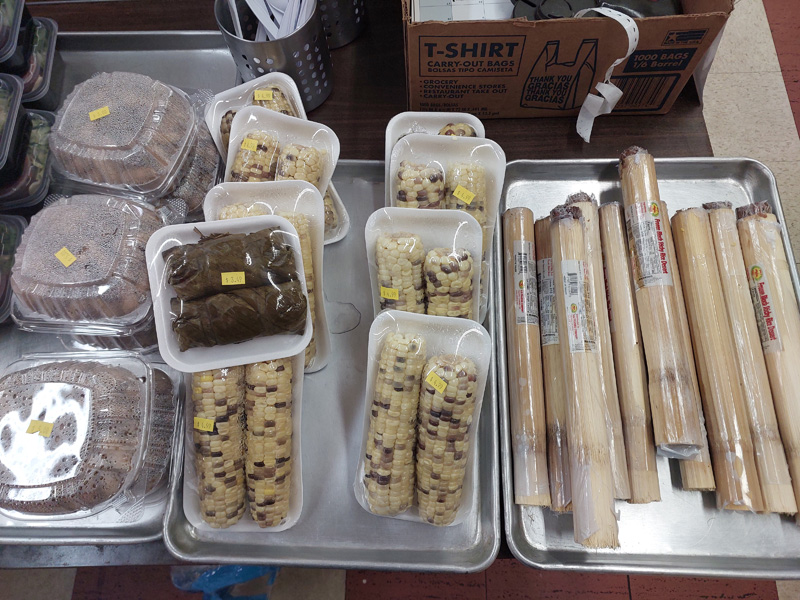
What Nam Mu lacks in size it makes up for with a large variety of ready-made meals and snacks, ranging from noodle salads to curries to deep fried fritters and traditional desserts. Here we tried menu items that we had not seen at other Karen delis, or items we haven’t tried yet: Burmese chicken biriyani, pork sausage, pork curry, and Burmese halawa. Burmese biriyani ($8), also known as Dan Buak, is more mild in spices compared to its Indian cousin. The yellow turmeric spiced rice is mixed with sweet raisins, creamy cashew nuts, and topped with crispy fried shallots, making each spoonful a fun surprise of textures and savory sweetness. Importantly, the chicken should be enjoyed with the rice as its marinade brings saltiness and moisture to the rice.

The dish that truly shined and left us wanting more was the pork sausage ($6). It was a fatty lightly fermented sausage that had a satisfying bite from its density, a texture similar to Chinese sausage. The filling was juicy from the fats and the herbs used, mixed with warm spices like chili and black pepper, and left a subtly sour, rich aftertaste from the fermentation.
A staple dish to pair with rice for any meal of the day, the hearty pork curry ($8.23) was familiar and filling. The cuts of pork belly were fatty and soft, and the curry base leaned towards turmeric and ginger rather than the red oily bases of the other curries we’ve tried.
For dessert, we had Burmese halawa ($5), a milky, rice flour and tapioca dessert that was somewhere between the consistency of bread pudding and jelly. The texture is creamy and smooth from the evaporated milk and coconut milk, but still has slight earthiness from the poppy seeds scattered on top.
AN ONGOING WAR
February 1 marked the second anniversary of the 2021 military coup d’etat that ousted a democratically elected government in Myanmar. The violence and repression of the military regime continues to threaten the lives of civilians. It is a reminder that the conflict and oppression that plagued Myanmar in its past, which facilitated the arrival of Myanmar refugees to Minnesota, continues to this day. Raging since 1948, the conflict in Myanmar is the longest ongoing civil war in the world.
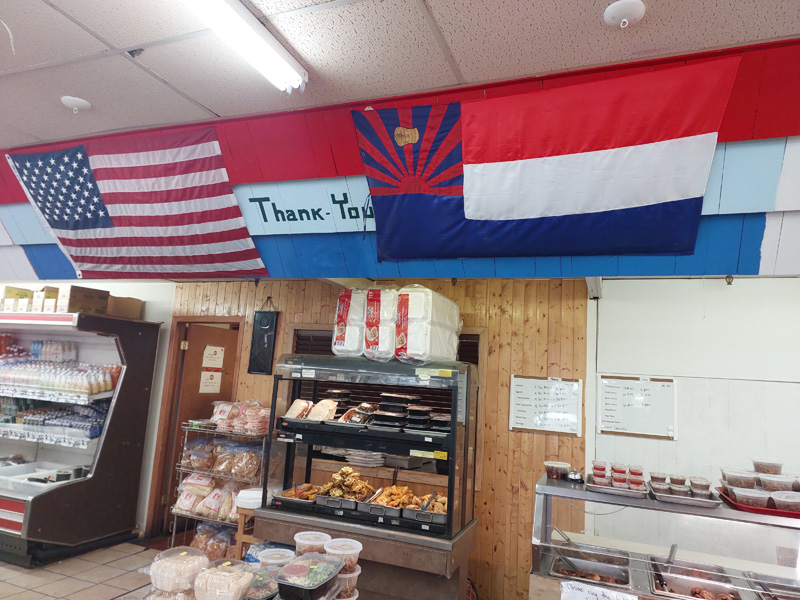
Despite brutal airstrikes and unjust executions, the peoples’ civil disobedience movement (CDM) is on-going, powerful, and awe-inspiring. As Myanmar civilians continue to resist and liberate their peoples, both in Myanmar and elsewhere, they ask for international recognition and solidarity with their struggle.
As recent refugees and immigrants, members of the Myanmar diaspora still have close connections with their land, family, and friends back home. Law Law says: “I pray and hope that one day we will have our country. Not the whole country, but at least a little part that we used to live in, called ‘Kawthoolei’. At least if you can give us that little piece so that we could go home, and live in our home. My grandma still lives in Burma. When the coup happened, my grandma had to run from her home too. We can’t go and visit her there. My hope is that one day that there is enough peace for us to go and visit.”
Supporting Myanmar refugees’ businesses and food is a way to engage and hear their stories of survival, all the way from Myanmar to Minnesota. When enjoying Myanmar food in Minnesota, it is important to understand how its historical and current political context enables it to take shape in front of us. Food is an entryway to celebrating and appreciating our community members for the cultures they bring to our homes and bellies.

